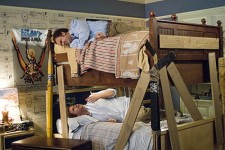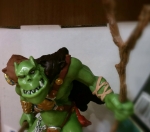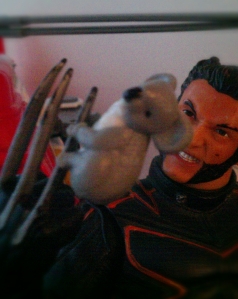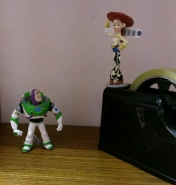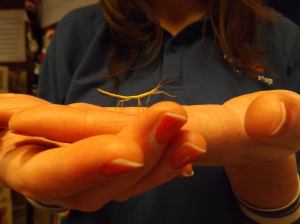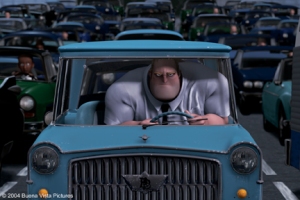 Now don’t freak out, I’m not sitting judging every customer who comes into the shop but I do notice trends in the kinds of things people buy and I can’t help but notice a slow change in the kinds of toys children are asking for. A common theme that still comes up when children are choosing toys is that a lot of them like get toys to do with a parent’s job. The strange thing I’ve noticed (and the topic of this post) is that this trend is waning, from an earlier and earlier age children are less inclined towards the traditional hero-worship of their parents’ jobs.
Now don’t freak out, I’m not sitting judging every customer who comes into the shop but I do notice trends in the kinds of things people buy and I can’t help but notice a slow change in the kinds of toys children are asking for. A common theme that still comes up when children are choosing toys is that a lot of them like get toys to do with a parent’s job. The strange thing I’ve noticed (and the topic of this post) is that this trend is waning, from an earlier and earlier age children are less inclined towards the traditional hero-worship of their parents’ jobs.
 First off the job thing has probably been done since little Ug junior got a club just like his daddy’s and went through a stone-aged world trying to bop unsuspecting pre-historic creatures on the head. Nowadays there are more subtleties, I’d imagine, in the kind of jobs parents do. For years the definitions and responsibilities of different jobs have been changing, there are new technology-based jobs that never existed before and a growing industry of information processing and content creation which make it harder for parents working in these fields to explain their job to their child. When this happens you either find that the child ends up mimicking a simplified idea of what their parent(s) do for a living or they give up on the whole thing and get into superheroes and other non-ordinary characters (like Barbie and characters from cartoon shows).
First off the job thing has probably been done since little Ug junior got a club just like his daddy’s and went through a stone-aged world trying to bop unsuspecting pre-historic creatures on the head. Nowadays there are more subtleties, I’d imagine, in the kind of jobs parents do. For years the definitions and responsibilities of different jobs have been changing, there are new technology-based jobs that never existed before and a growing industry of information processing and content creation which make it harder for parents working in these fields to explain their job to their child. When this happens you either find that the child ends up mimicking a simplified idea of what their parent(s) do for a living or they give up on the whole thing and get into superheroes and other non-ordinary characters (like Barbie and characters from cartoon shows).
This is before you even get into how exciting or boring the parent’s overall job is. I work in a toy shop, exciting right? Well yes, sometimes, the toys are exciting but I’m not sure how exciting they find the shop work so when my kids get tired of playing shops they’ve got a mummy that works in a swimming pool, a grampa who’s a farmer and another grampa who’s a ‘fixer’ (my dad ran a handy-man company then went into fixing up properties). Out of all of these my kids are pretty much sorted for emulating jobs but when families that have more unusual/difficult to explain jobs come into the shop I have to admit you see a lot more super heroes and other fantasy jobs getting looked at.
I can’t help but wonder what this feels like for these parents. These parents probably emulated jobs as kids but now their own jobs are so hard to define that their children just give up on the early-years hero-worship of their parents’ profession and plunge right into the avengers, frozen, spider-man, batman, disney prinesses etc. etc.
 I had a small taster of how difficult job explanation can be when I was doing research for my MPhil. Back then Logan was only four and he just didn’t get what I was writing about. He often got upset when daddy had to go to the library to write for the day or when I had to head through and teach in Edinburgh. Far from something he wanted to emulate, for the most part I think he kind of resented my work. There were of course times when he would sit at his toy laptop and do his ‘writing’, he clearly wanted to understand what I was spending my time doing, he’d often choose to do his ‘writing’ when I was working at home. I loved it when he did this, but at the same time his interest would wander and fairly quickly he’d be back to being a zoo-keeper, an animal doctor or a palaeontologist. The thing was, even if he managed to understand the nature of my work, at the end of the day it just wasn’t very exciting.
I had a small taster of how difficult job explanation can be when I was doing research for my MPhil. Back then Logan was only four and he just didn’t get what I was writing about. He often got upset when daddy had to go to the library to write for the day or when I had to head through and teach in Edinburgh. Far from something he wanted to emulate, for the most part I think he kind of resented my work. There were of course times when he would sit at his toy laptop and do his ‘writing’, he clearly wanted to understand what I was spending my time doing, he’d often choose to do his ‘writing’ when I was working at home. I loved it when he did this, but at the same time his interest would wander and fairly quickly he’d be back to being a zoo-keeper, an animal doctor or a palaeontologist. The thing was, even if he managed to understand the nature of my work, at the end of the day it just wasn’t very exciting.
Perhaps that’s the tricky point so many parents are having to deal with, underneath all the difficult explanation lies a job that is quite simply boring (at least in the eyes of the average pre-schooler). With this in mind perhaps it’s better leaving a hint of mystery around what they do for a living, at least the mystery itself can make the job seem a little more exciting.
Do you have an unusual job, or just one that’s hard to explain to your kids? How have you gone about describing it to them, do they try to emulate it? Feel free to share in the comments area below, chat to me over on twitter or if you’re feeling particularly nice you can subscribe to get e-mailed my new blog posts as and when they come out (box off to the right). As always thanks for reading, Cheers, John








